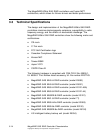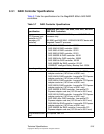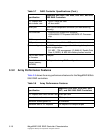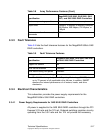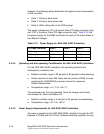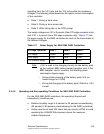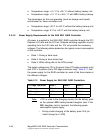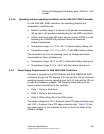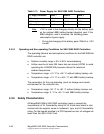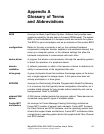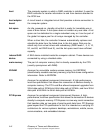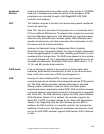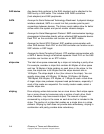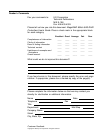A-4 Glossary of Terms and Abbreviations
Copyright © 2009 by LSI Corporation. All rights reserved.
SAS device Any device that conforms to the SAS standard and is attached to the
SAS bus by a SAS cable. This includes SAS RAID controllers
(host adapters) and SAS peripherals.
SATA Acronym for Serial Advanced Technology Attachment. A physical storage
interface standard, SATA is a serial link that provides point-to-point
connections between devices. The thinner serial cables allow for better
airflow within the system and permit smaller chassis designs.
SMP Acronym for Serial Management Protocol. SMP communicates topology
management information directly with an attached SAS expander device.
Each PHY on the controller can function as an SMP initiator.
SSP Acronym for Serial SCSI Protocol. SSP enables communication with
other SAS devices. Each PHY on the SAS controller can function as an
SSP initiator or SSP target.
STP Acronym for Serial Tunneling Protocol. STP enables communication with
a SATA II device through an attached expander. Each PHY on the SAS
controller can function as an STP initiator.
stripe size The total drive space consumed by a stripe not including a parity drive.
For example, consider a stripe that contains 64 Kbytes of drive space
and has 16 Kbytes of data residing on each drive in the stripe. In this
case, the stripe size is 64 Kbytes and the stripe element size is
16 Kbytes. The stripe depth is four (four drives in the stripe). You can
specify stripe sizes of 8 Kbytes, 16 Kbytes, 32 Kbytes, 64 Kbytes,
128 Kbytes, 256 Kbytes, 512 Kbytes, or 1 Mbyte for each virtual drive.
A larger stripe size produces improved read performance, especially if
most of the reads are sequential. For mostly random reads, select a
smaller stripe size.
striping Drive striping writes data across two or more drives. Each stripe spans
two or more drives but consumes only a portion of each drive. Each
drive, therefore, may have several stripes. The amount of space
consumed by a stripe is the same on each drive that is included in the
stripe. The portion of a stripe that resides on a single drive is a stripe
element. Striping by itself does not provide data redundancy; striping in
combination with parity provides data redundancy.




